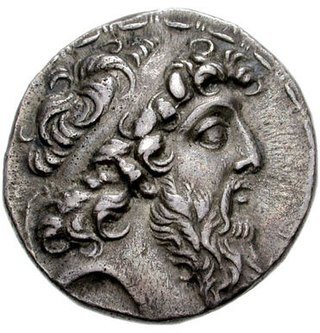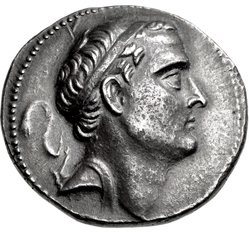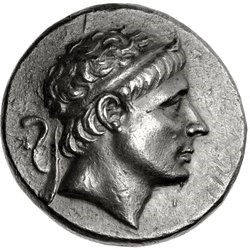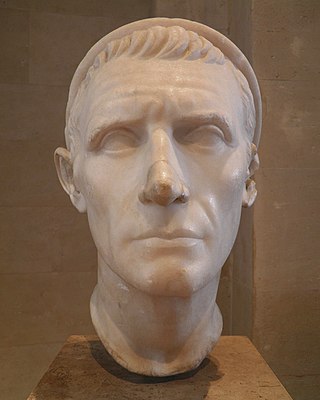
Alexander I Theopator Euergetes, surnamed Balas, was the ruler of the Seleucid Empire from 150 BC to August 145 BC. Picked from obscurity and supported by the neighboring Roman-allied Kingdom of Pergamon, Alexander landed in Phoenicia in 152 BC and started a civil war against Seleucid King Demetrius I Soter. Backed by mercenaries and factions of the Seleucid Empire unhappy with the existing government, he defeated Demetrius and took the crown in 150 BC. He married the princess Cleopatra Thea to seal an alliance with the neighboring Ptolemaic kingdom. His reign saw the steady retreat of the Seleucid Empire's eastern border, with important eastern satrapies such as Media being lost to the nascent Parthian Empire. In 147 BC, Demetrius II Nicator, the young son of Demetrius I, began a campaign to overthrow Balas, and civil war resumed. Alexander's ally, Ptolemaic king Ptolemy VI Philometor, moved troops into Coele-Syria to support Alexander, but then switched sides and threw his support behind Demetrius II. At the Battle of the Oenoparus River in Syria, he was defeated by Ptolemy VI and he died shortly afterward.

The 2nd century BC started the first day of 200 BC and ended the last day of 101 BC. It is considered part of the Classical era, although depending on the region being studied, other terms may be more suitable. It is also considered to be the end of the Axial Age. In the context of the Eastern Mediterranean, it is the mid-point of the Hellenistic period.
This article concerns the period 229 BC – 220 BC.
This article concerns the period 159 BC – 150 BC.
This article concerns the period 169 BC – 160 BC.
This article concerns the period 189 BC – 180 BC.
This article concerns the period 199 BC – 190 BC.
Year 150 BC was a year of the pre-Julian Roman calendar. At the time it was known as the Year of the Consulship of Flamininus and Balbus. The denomination 150 BC for this year has been used since the early medieval period, when the Anno Domini calendar era became the prevalent method in Europe for naming years.

Year 220 BC was a year of the pre-Julian Roman calendar. At the time it was known as the Year of the Consulship of Laevinus/Catulus and Scaevola/Philo. The denomination 220 BC for this year has been used since the early medieval period, when the Anno Domini calendar era became the prevalent method in Europe for naming years.
Year 160 BC was a year of the pre-Julian Roman calendar. At the time it was known as the Year of the Consulship of Gallus and Cethegus and the Fourth Year of Houyuan. The denomination 160 BC for this year has been used since the early medieval period, when the Anno Domini calendar era became the prevalent method in Europe for naming years.
Year 292 BC was a year of the pre-Julian Roman calendar. At the time it was known as the Year of the Consulship of Gurges and Scaeva. The denomination 292 BC for this year has been used since the early medieval period, when the Anno Domini calendar era became the prevalent method in Europe for naming years.
Year 281 BC was a year of the pre-Julian Roman calendar. At the time it was known as the Year of the Consulship of Barbula and Philippus. The denomination 281 BC for this year has been used since the early medieval period, when the Anno Domini calendar era became the prevalent method in Europe for naming years.

Demetrius I, surnamed Soter, reigned as king (basileus) of the Hellenistic Seleucid Empire from November 162 to June 150 BC. Demetrius grew up in Rome as a hostage, but returned to Greek Syria and overthrew his young cousin Antiochus V Eupator and regent Lysias. Demetrius took control during a turbulent time of the Empire, and spent much of his time fighting off revolts and challenges to his power from threats such as Timarchus and Alexander Balas.

Demetrius II, called Nicator, was one of the sons of Demetrius I Soter. His mother may have been Laodice V, as was the case with his brother Antiochus VII Sidetes. Demetrius ruled the Seleucid Empire for two periods, separated by a number of years of captivity in Hyrcania in Parthia, first from September 145 BC to July/August 138 BC, and again from 129 BC until his death in 125 BC. His brother Antiochus VII ruled the Seleucid Empire in the interim between his two reigns.

Demetrius III Theos Philopator Soter Philometor Euergetes Callinicus was a Hellenistic Seleucid monarch who reigned as the King of Syria between 96 and 87 BC. He was a son of Antiochus VIII and, most likely, his Egyptian wife Tryphaena. Demetrius III's early life was spent in a period of civil war between his father and his uncle Antiochus IX, which ended with the assassination of Antiochus VIII in 96 BC. After the death of their father, Demetrius III took control of Damascus while his brother Seleucus VI prepared for war against Antiochus IX, who occupied the Syrian capital Antioch.

Seleucus IV Philopator, ruler of the Hellenistic Seleucid Empire, reigned from 187 BC to 175 BC over a realm consisting of Syria, Mesopotamia, Babylonia and Nearer Iran.

Antiochus I Soter was a Macedonian king of the Seleucid Empire. Antiochus succeeded his father Seleucus I Nicator in 281 BC and reigned during a period of instability which he mostly overcame until his death on 2 June 261 BC. He is the last known ruler to be attributed the ancient Mesopotamian title King of the Universe.

Antiochus II Theos was a Greek king of the Hellenistic Seleucid Empire who reigned from 261 to 246 BC. He succeeded his father Antiochus I Soter in the winter of 262–61 BC. He was the younger son of Antiochus I and princess Stratonice, the daughter of Demetrius Poliorcetes.

Antiochus III the Great was a Greek Hellenistic king and the 6th ruler of the Seleucid Empire, reigning from 223 to 187 BC. He ruled over the region of Syria and large parts of the rest of western Asia towards the end of the 3rd century BC. Rising to the throne at the age of eighteen in April/June 223 BC, his early campaigns against the Ptolemaic Kingdom were unsuccessful, but in the following years Antiochus gained several military victories and substantially expanded the empire's territory. His traditional designation, the Great, reflects an epithet he assumed. He also assumed the title Basileus Megas, the traditional title of the Persian kings. A militarily active ruler, Antiochus restored much of the territory of the Seleucid Empire, before suffering a serious setback, towards the end of his reign, in his war against Rome.
Laodice IV was a Greek princess, head priestess and a queen of the Seleucid Empire. Antiochus III appointed Laodice in 193 BC, as the chief priestess of the state cult dedicated to her mother Laodice III in Media. She later was married to three kings of the Seleucid Empire --all her brothers.









